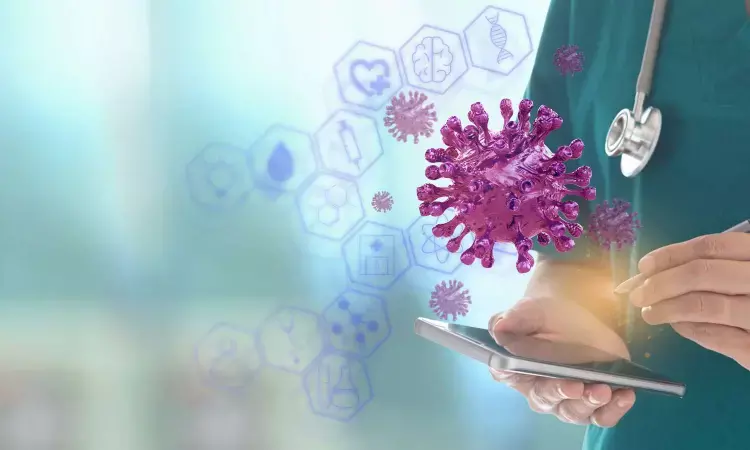- Home
- Medical news & Guidelines
- Anesthesiology
- Cardiology and CTVS
- Critical Care
- Dentistry
- Dermatology
- Diabetes and Endocrinology
- ENT
- Gastroenterology
- Medicine
- Nephrology
- Neurology
- Obstretics-Gynaecology
- Oncology
- Ophthalmology
- Orthopaedics
- Pediatrics-Neonatology
- Psychiatry
- Pulmonology
- Radiology
- Surgery
- Urology
- Laboratory Medicine
- Diet
- Nursing
- Paramedical
- Physiotherapy
- Health news
- Fact Check
- Bone Health Fact Check
- Brain Health Fact Check
- Cancer Related Fact Check
- Child Care Fact Check
- Dental and oral health fact check
- Diabetes and metabolic health fact check
- Diet and Nutrition Fact Check
- Eye and ENT Care Fact Check
- Fitness fact check
- Gut health fact check
- Heart health fact check
- Kidney health fact check
- Medical education fact check
- Men's health fact check
- Respiratory fact check
- Skin and hair care fact check
- Vaccine and Immunization fact check
- Women's health fact check
- AYUSH
- State News
- Andaman and Nicobar Islands
- Andhra Pradesh
- Arunachal Pradesh
- Assam
- Bihar
- Chandigarh
- Chattisgarh
- Dadra and Nagar Haveli
- Daman and Diu
- Delhi
- Goa
- Gujarat
- Haryana
- Himachal Pradesh
- Jammu & Kashmir
- Jharkhand
- Karnataka
- Kerala
- Ladakh
- Lakshadweep
- Madhya Pradesh
- Maharashtra
- Manipur
- Meghalaya
- Mizoram
- Nagaland
- Odisha
- Puducherry
- Punjab
- Rajasthan
- Sikkim
- Tamil Nadu
- Telangana
- Tripura
- Uttar Pradesh
- Uttrakhand
- West Bengal
- Medical Education
- Industry
COVID-19's Silent Impact: Multiorgan Abnormalities Lurk in Survivors

In the relentless battle against COVID-19, a new study conducted across the United Kingdom has illuminated a previously hidden facet of the virus's aftermath. This study, known as C-MORE (Coronavirus Multiorgan Rehabilitation), delves into the aftermath of COVID-19 infections, shedding light on the enduring health effects that persist months after patients have been discharged from the hospital.
The study results were published in the journal The Lancet Respiratory Medicine.
The world is grappling with the enduring COVID-19 pandemic. It is a stark reminder that the journey doesn't end with recovery from the acute phase of the disease. Instead, for many survivors, it marks the beginning of a new chapter where the virus's multiorgan impact continues to haunt them. This study was a prospective, UK-wide, multicentre MRI follow-up study (C-MORE) carried out as a part of the larger Post-hospitalization COVID-19 study ( PHOSP-COVID). C_MORE utilized advanced MRI technology to assess the health status of individuals aged 18 and above who had been discharged from the hospital after battling COVID-19 and were compared to the controls who did not have COVID. The main outcome was to assess the burden of multiorgan abnormalities after MRI.
The Findings:
- Among the 259 COVID-19 patients studied, a staggering 61% showed evidence of multiorgan abnormalities on MRI scans, compared to just 27% of the 52 individuals in the control group with the abnormalities spanning across various organs and most commonly in the lungs, brain, and kidneys.
- Lung abnormalities were a particularly prevalent issue, with MRI scans revealing parenchymal abnormalities in COVID-19 patients explaining some of the persistent respiratory symptoms reported by those battling the virus.
- Brain abnormalities like white matter hyperintensities and regional brain volume reduction were identified in a significant number of patients, thus shedding light on the cognitive and neurological symptoms reported by some COVID-19 survivors.
- Cardiac and liver abnormalities were not significantly different between COVID-19 patients and the control group suggesting that the virus has a profound impact on certain organs and it may not affect others to the same degree.
- The study also uncovered significant associations between multiorgan abnormalities and patient characteristics. COVID-19 patients with these abnormalities tended to be older, had a higher prevalence of comorbidities, and had experienced more severe acute infections during their hospitalization.
- Multiorgan abnormalities were linked to persistent physical and mental health impairment. Patients with these abnormalities reported more severe and prolonged symptoms, highlighting the importance of ongoing care and support for those who have battled COVID-19.
These findings underscore the need for proactive, multidisciplinary care for COVID-19 survivors, with a focus on monitoring and managing the potential long-term consequences of the virus. Imaging techniques, such as MRI, could play a pivotal role in guiding healthcare providers in assessing and addressing post-COVID-19 complications.
Further reading: Multiorgan MRI findings after hospitalization with COVID-19 in the UK (C-MORE): a prospective, multicentre, observational cohort study. https://doi.org/10.1016/S2213-2600(23)00262-X
BDS, MDS
Dr.Niharika Harsha B (BDS,MDS) completed her BDS from Govt Dental College, Hyderabad and MDS from Dr.NTR University of health sciences(Now Kaloji Rao University). She has 4 years of private dental practice and worked for 2 years as Consultant Oral Radiologist at a Dental Imaging Centre in Hyderabad. She worked as Research Assistant and scientific writer in the development of Oral Anti cancer screening device with her seniors. She has a deep intriguing wish in writing highly engaging, captivating and informative medical content for a wider audience. She can be contacted at editorial@medicaldialogues.in.
Dr Kamal Kant Kohli-MBBS, DTCD- a chest specialist with more than 30 years of practice and a flair for writing clinical articles, Dr Kamal Kant Kohli joined Medical Dialogues as a Chief Editor of Medical News. Besides writing articles, as an editor, he proofreads and verifies all the medical content published on Medical Dialogues including those coming from journals, studies,medical conferences,guidelines etc. Email: drkohli@medicaldialogues.in. Contact no. 011-43720751


